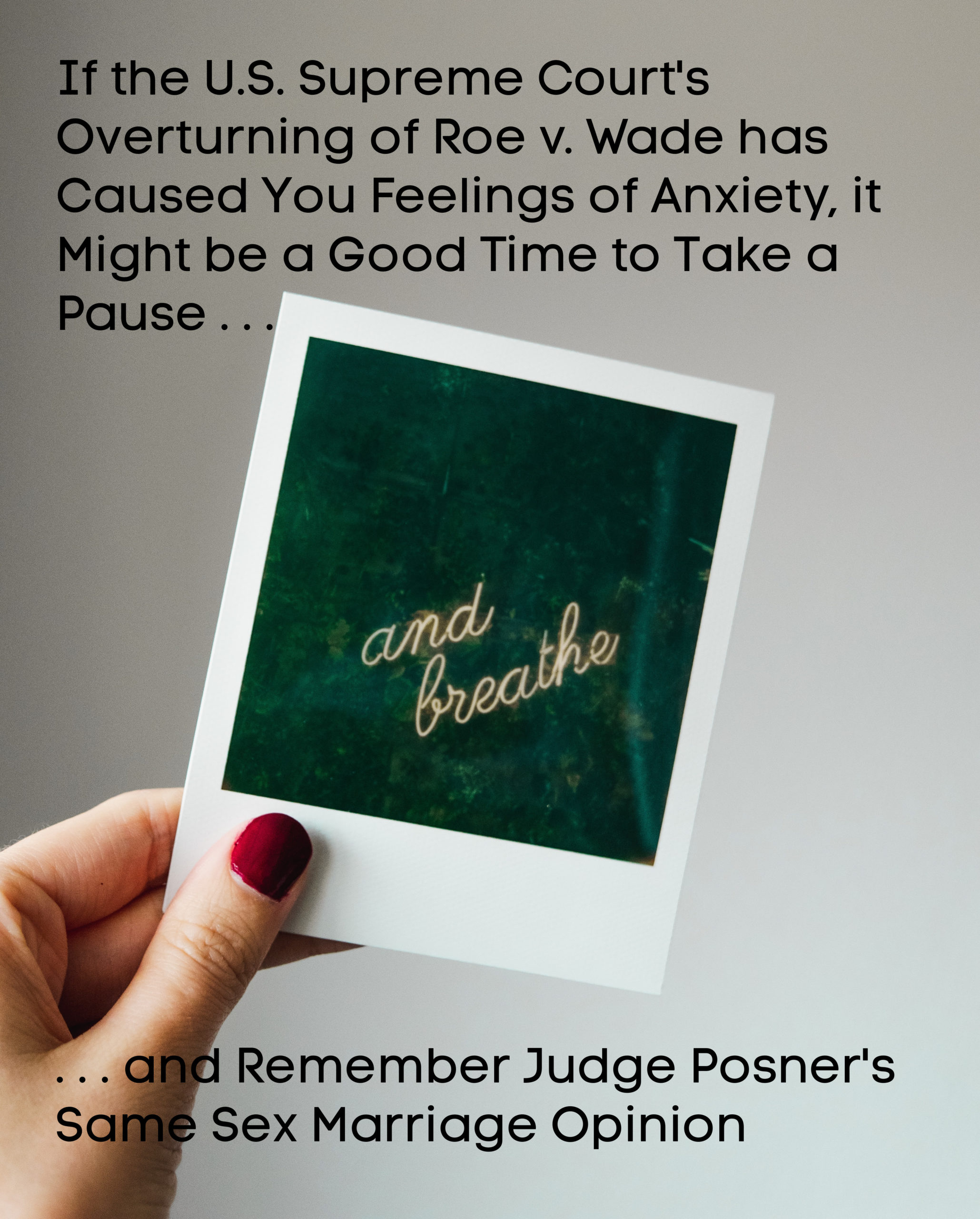If the U.S. Supreme Court’s Overturning of Roe v. Wade has Caused You Feelings of Anxiety, it Might be a Good Time to Take a Pause . . .

Posted on August 11, 2022 by Will Reingold
With Roe v. Wade overruled, people are aptly concerned that the constitutionality of same-sex marriage may be in jeopardy. That fear is exacerbated by Justice Thomas’ concurrence in Dobbs v. Jackson Women’s Health Organization, insisting that the Supreme Court’s rationale for overruling Roe be applied to Obergefell v. Hodges’ conclusion that the Due Process Clause of the Fourteenth Amendment guarantees a fundamental right to marry for same-sex couples. For people concerned about a civil rights rollback and the further undoing of universal marital rights, feelings of anxiety and anticipation are palpable.
For those that fall into the category of concerned people, this is a good time to pause, take a breath, and turn to something that makes you smile and provide hope. I recommend reading Baskin v. Bogan, 766 F.3d 648 (7th Cir. 2014), the Seventh Circuit Court of Appeals striking down bans on same-sex marriage the year prior to Obergefell. The case involved Wisconsin and Indiana state statutes that forbid same-sex marriage. The United States District Court for the Southern District of Indiana invalidated those statutes as being unconstitutional, and both states appealed the decision to the Seventh Circuit. The cases were consolidated and presented as one on appeal.
That alone probably does not sound too interesting, but I would invite you to treat yourself to this opinion. As I will explain, it is a delightful read. (But you can skip the lengthy introductory matters and start on the bottom of page 7.) Baskin was authored by Judge Richard Posner—the most cited legal writer of our time, known for his extremely prodigious output of books, articles, and over 3,300 judicial opinions prior to his retirement a few years back. His opinions are uniquely thorough, weighing every possible argument in favor of the parties’ respective positions before reaching a meticulously thoughtful decision. They tend to be long and dense, but not boring—Justice Elena Kagan has said that Posner was incapable of penning uninteresting opinions. Indeed, his colorful voice is highlighted by his witty aphorisms and sardonic wit.
That dry, sarcastic humor was on full display in Baskin, surgically dissecting each argument by the attorneys for Indiana and Wisconsin as to why laws forbidding same-sex marriage should be allowed. Take the following paragraph from Posner’s opinion in which he sets up—and knocks down—Indiana’s argument as to whether there is a difference between same-sex and opposite-sex parents’ ability to raise children. He almost playfully turns Indiana’s reasoning on its head to demonstrate how illogical it really is:
“At oral argument the state’s lawyer was asked whether ‘Indiana’s law is about successfully raising children,’ and since ‘you agree same-sex couples can successfully raise children, why shouldn’t the ban be lifted as to them?’ The lawyer answered that ‘the assumption is that with opposite-sex couples there is very little thought given during the sexual act, sometimes, to whether babies may be a consequence.’ In other words, Indiana’s government thinks that straight couples tend to be sexually irresponsible, producing unwanted children by the carload, and so must be pressured (in the form of governmental encouragement of marriage through a combination of sticks and carrots) to marry, but that gay couples, unable as they are to produce children wanted or unwanted, are model parents—model citizens really—so have no need for marriage. Heterosexuals get drunk and pregnant, producing unwanted children; their reward is to be allowed to marry. Homosexual couples do not produce unwanted children; their reward is to be denied the right to marry. Go figure.”
Another lively example comes when Posner confronts Wisconsin’s argument that, traditionally, “marriage is only between a man and a woman.” Posner first answers that this was the same argument rejected by the Supreme Court in Loving v. Virginia, the case allowing for interracial marriage. He could have simply analogized same-sex marriage to interracial marriage, cited Loving, and went about his day—but Posner went on to break down in greater detail why the appeal to tradition is misplaced:
“Tradition per se has no positive or negative significance. There are good traditions, bad traditions pilloried in such famous literary stories as Franz Kafka’s ‘In the Penal Colony’ and Shirley Jackson’s ‘The Lottery,’ bad traditions that are historical realities such as cannibalism, foot-binding, and suttee, and traditions that from a public-policy standpoint are neither good nor bad (such as trick-or-treating on Halloween). Tradition per se therefore cannot be a lawful ground for discrimination—regardless of the age of the tradition. Holmes thought it ‘revolting to have no better reason for a rule of law than that so it was laid down in the time of Henry IV.’ . . . Henry IV (the English Henry IV, not the French one—Holmes presumably was referring to the former) died in 1413. Criticism of homosexuality is far older. In Leviticus 18:22 we read that ‘thou shalt not lie with mankind, as with womankind: it is abomination.’”
From these two examples, you can see Posner takes his time to develop his arguments. Absent are pithy, catchy lines warranting front-page headline treatment from the newspapers. Justice Kennedy, the one who authored Obergefell, took the opposite approach. Kennedy relished the spotlight. Consider the conclusory paragraph of Obergefell, in which Kennedy elegantly summarizes the constitutionality of same-sex marriage:
“No union is more profound than marriage, for it embodies the highest ideals of love, fidelity, devotion, sacrifice, and family. In forming a marital union, two people become something greater than once they were. As some of the petitioners in these cases demonstrate, marriage embodies a love that may endure even past death. It would misunderstand these men and women to say they disrespect the idea of marriage. Their plea is that they do respect it, respect it so deeply that they seek to find its fulfillment for themselves. Their hope is not to be condemned to live in loneliness, excluded from one of civilization’s oldest institutions. They ask for equal dignity in the eyes of the law. The Constitution grants them that right.”
By contrast, Baskin reads as though Posner has quietly meditated on each and every possible argument for and against same-sex marriage and concluded that there are no constitutionally-legitimate reasons to prevent same-sex couples from marrying. But Posner was not done writing about this topic. Once Obergefell was decided, Posner authored an article for Slate.com in which he gave his thoughts on the dissenting justices’ opinions, treating Chief Justice Roberts and Justice Alito with sarcastic disdain. From his Slate article, the following paragraph specifically pursues a claim made by Roberts:
“The Chief Justice criticizes the majority for ‘order[ing] the transformation of a social institution that has formed the basis of human society for millennia, for the Kalahari Bushmen and the Han Chinese, the Carthaginians and the Aztecs. Just who do we think we are?’ We’re pretty sure we’re not any of the above. And most of us are not convinced that what’s good enough for the Bushmen, the Carthaginians, and the Aztecs should be good enough for us. Ah, the millennia! Ah, the wisdom of ages! How arrogant it would be to think we knew more than the Aztecs—we who don’t even know how to cut a person’s heart out of his chest while’s he still alive, a maneuver they were experts at.”
Beautiful. If you would like to read the Slate article, you can do so here. As we navigate the ever changing laws and world climate, the Family Law Practice Group at Lasher is here to provide assistance, understanding, and, of course, at times, levity. If we can be of any assistance to you, please don’t hesitate to reach out.

